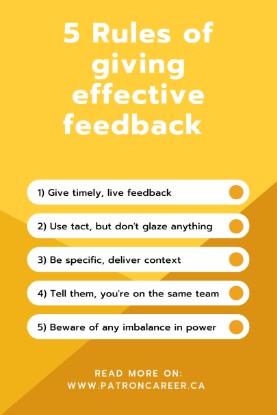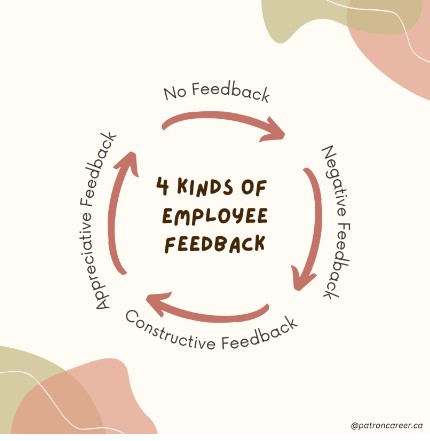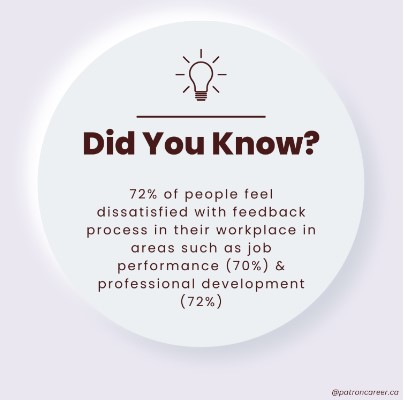
Steps To Create Appraisal
18 November, 2022
Patron Career Staffing firmly believes in adopting a tailored approach to meet temporary and permanent recruitment needs. We safeguard the interest of our clients by finding such workers who are knowledgeable and reliable.
About UsNeed help? Make a Call
32 Dundas Street East Unit A, L5A1W2

The underlying foundation of healthy communication in any organization is a peer to peer feedback. Organizational feedback plays a vital role to understand the overall performance criteria of employees and managers and lays down ways for them to achieve better results.
Bill gates believed that “we all need people who will give us feedback. That's how we improve”. Feedback sets the tone for the improvement of the workforce. It is the key to establishing a productive culture, where people have a sense of direction.
Constructive feedback is a two-way street. Not only giving feedback but also receiving healthy feedback is important for both employees and managers. Employees are often hardwired to construe negative feedback as a source of harshness towards them. But it plays a crucial role in their self-awareness and career development, by guiding them in the right direction.

For a company like PCS, which provides staffing solutions to employers and businesses all over the GTA, feedback is an integral part of our work. Whether it is formal, informal, external, or internal, giving and receiving feedback aids us in the improvement of our services and leads us toward greater success.
Here is why corrective feedback owns the workplace:
1. Initiates change; boosts growth An effective feedback system helps augment the work processes by getting things done in less time. When employees receive feedback, it allows them to work on their job roles, responsibilities, and weaknesses. According to the Harvard business review, real-time feedback by managers improves the performance of employees. 57%
of people feel corrective feedback is conducive to their growth and development in and outside the workplace.
Even so, when managers appraise their subordinates regarding their performance, ability, or skills, it helps to eliminate the faux pas and buttress positive behavior leading to a harmonious workplace.
Plus, feedback, when done right, gives both managers and employees insight into how they are perceived by others, and how their actions and temperament impact other people around the organization.
2. Better employee engagement
Employees may not always say it, but they do crave feedback. It keeps them on track. They know whether or not their efforts are meeting with success for the company.
Imagine a worker who receives little or no feedback. He performs his duties and tasks in the same fashion every day, leading to no room for improvement. This pattern is not healthy. The employee will get weary of his job and eventually he will quit. To avoid this whammy, continuous feedback and evaluation will boast employee engagement.
Also read: Employee experience is the key to lasting industry success.
3. Fuels motivation
When Bob Nelson said- “an employee’s motivation is a direct result of the sum of interactions with his or her manager.” He was hinting about the importance of feedback in an organization. To achieve a motivated workforce, organizations spur motivation through praise, gratitude, and positive feedback. You let them know they are valued and heard, and they will work for the best advantage of your company. As a manager, treating the employees as an important part of the business will motivate them to another level. For instance, saying to them how impressed you are with how they managed to meet every goal before them is simply saying to them that they are a tremendous asset to your team.

4. Improves performance
When delivered in a thoughtful, empathic way, employee feedback has the power to enhance team productivity and performance. As explained, it keeps everybody on track and builds a strong communication channel. The team gains the ability to reach better decisions and brainstorming improves. Actionable feedback instills motivation, builds momentum, and apprizes workmen on how well he/she did during their term of employment.
At times employees are so afraid of criticism, that they forget about getting feedback from their superiors. Even some managers are reluctant to provide constructive feedback to their employees because they don’t want to be perceived as a critic. Such perceptions are futile and do not foster a strong company culture.
5. Foster a positive working environment
In continuation to the preceding point, the working culture of your organization is reinforced, should you provide regular feedback. Although there is no ‘one size fits all’ technique, you may choose from any of the various processes - formal reports, performance appraisals, appreciation, evaluation, encouragement, or informal peer-to- peer feedback. All of these feedback methods have their pros and cons, and when done tactfully, they can fuel the success of your organization.
Another associated advantage is that feedback helps to avoid major mistakes. With regular feedback sessions and reviews, you receive desired outputs from individuals, teams, and departments. It also enables product and service improvements.

6. Accelerate employee retention
Effective feedback is the key to keeping your best people. If the employees are not heard or valued, they are like to quit their jobs owing to pressure of where they went wrong. A continuous feedback circuit, like once every month or every two months, will result in a loyal, adept workforce. It will also improve and secure employee relationships.
Now that it is clear that actionable feedback has several advantages, it is high time to start imparting feedback as your next move. It will get your employees the required support and will benefit your company in the long run.
